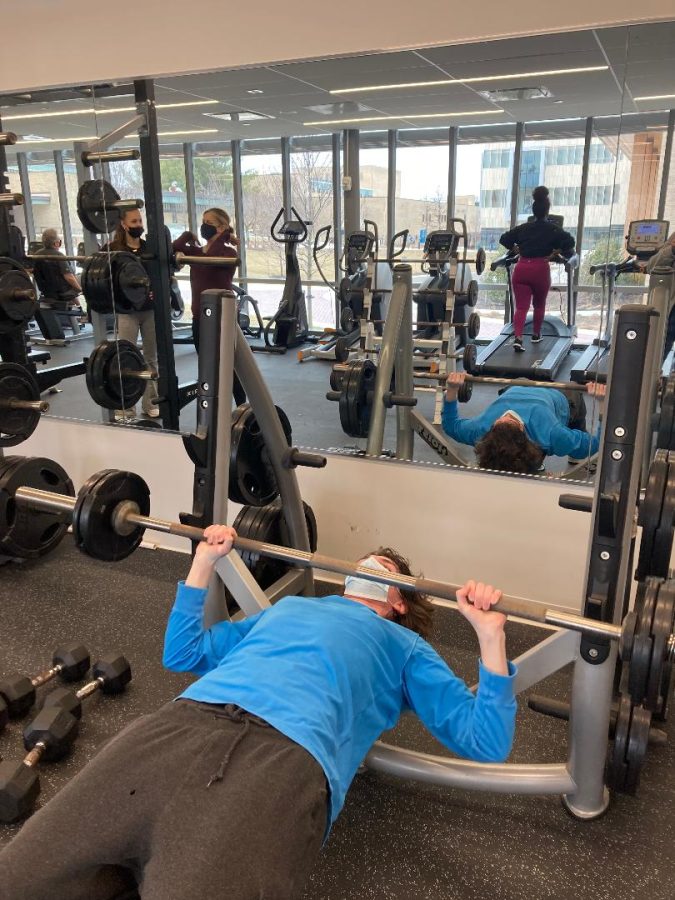Coach: Consistency, small goals lead to lasting fitness
First-year psychology student Austin Smith, who is on AACC’s golf team, works out in Jenkins gym. In mirror, women’s cross country coach Susan Noble (right) demonstrates the proper use of gym equipment.
February 17, 2022
An adjunct health professor said in February the best way to get in shape is to exercise consistently.
Susan Noble, who is also the head coach for women’s cross country, recommended that beginners start with small, achievable fitness goals.
“It doesn’t really matter so much what you’re doing right away,” Noble said. “It’s showing up. You’re not going to get fit by coming to the gym or doing something once in a while. You need to start making it a habit. You want to make it feel worse on days that you don’t go than on the days that you do go.”
Even working out for just 10 minutes has benefits, Noble said.
“Commit to coming into the gym for 10 to 15 minutes three times a week,” Noble said. “Start [small], don’t say, ‘I’m going to come in here five days a week and I’m going to work out for an hour’ because you can’t go from zero to an hour. [Commit] to something small and manageable.”
Students can work out in the Jenkins Gymnasium Mondays and Wednesdays from noon to 1:30 p.m. and on Tuesdays and Thursdays from 7:30 am to 8:30 a.m. and 4 p.m. to 6 p.m.
Second-year business major Gabriel Da Rocha works out twice a week. He targets the upper body on the first and the lower half the next day.
“I usually do Tuesdays and Thursdays, just because [of] my school schedule,” Da Rocha said. “On Tuesdays [for] my upper body, it’s biceps, triceps, chest, some lower back, upper back and some abs. I mostly use isolated machines. But then[for] legs [I] go for the calves, glutes and everything [lower body related].”
Noble said the frequency of workouts depends on the individual’s fitness goals.
“It depends what your goals are for basic cardio fitness,” Noble said. “Just to maintain good mental health and keep your heart healthy … 20 minutes a day of moderate exercise is what is recommended.”
First-year nursing student Savannah Davidson runs two to four times a week for four to five miles. She said she stretches before she runs.
Stretch is “very important,” Davidson said. “It gets the lactic acid out of the muscles, [which] can cause … cramping and muscle fatigue.”
Noble said it’s also important to work out regularly.
Da Rocha agreed.
“I had to tell myself I paid for this commitment,” Da Rocha said. “It kind of gave me a reason to keep going [to a gym] to make the most of my money.”
Davidson said pacing herself helps when it comes to staying the course.
“When you’re doing your runs, don’t push yourself too hard,” Davidson said. “One week, run two miles at a time. And then the next week, try to go for two and a half or three. Just try to build off of what you’re doing.”
To lose weight, Noble said to eat fewer calories.
“The only way to lose weight [and] body fat is a calorie deficit,” Noble said. “If you are not in a calorie deficit, you are not going to lose weight.”
To gain muscle, she said to lift heavy weights and eat a lot of protein.
Noble said seven to 10 hours of sleep is best for recovery time after a hard workout.












